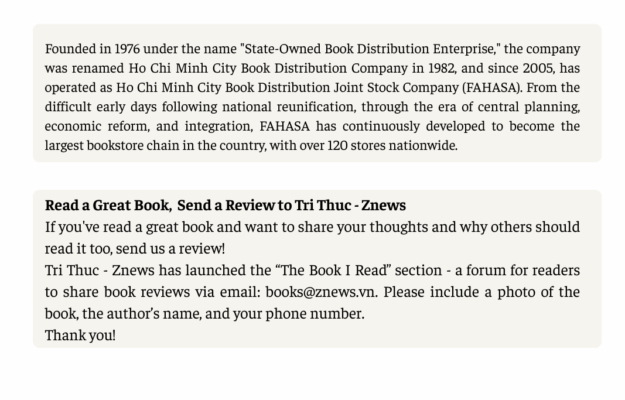Nearly 50 years since its establishment, Ho Chi Minh City Book Distribution Corporation (FAHASA) has consistently strived to overcome challenges, adapt, and grow in line with the changing context of each period.

Founded in 1976, after nearly five decades, FAHASA is now the largest bookstore chain in the country, actively supporting publishers in bringing books to readers. Continuing the legacy of his father, Mr. Pham Minh Thuan – founder of FAHASA – Mr. Pham Nam Thang is now the successor, leading the business into the digital age and a new phase of development.
Recently, FAHASA was selected as one of 50 exemplary businesses with leading brands and core products of Ho Chi Minh City, in celebration of the 50th anniversary of national reunification.
On this occasion, FAHASA General Director Pham Nam Thang spoke with Tri Thuc – Znews about the company’s 50-year journey accompanying Vietnam’s publishing industry.
Providing High-Quality Book Distribution Services
Is the Core Mission
– Hello! Could you share the valuable lessons you learned from your father’s business philosophy?
– I was fortunate to grow up observing and learning from my father – a visionary leader with steadfast and clear business strategies. He always emphasized the importance of adaptability and putting people at the center of every decision.

My father believed that to build a sustainable business, it’s essential to care for the workforce and invest in internal training and development. Thanks to this philosophy, FAHASA overcame many difficult periods – from the centrally planned economy era to the volatile market economy. This philosophy has become my guiding compass in managing and leading the company.
– FAHASA has endured several difficult periods, such as before 1986 and during the COVID-19 pandemic. How did the company overcome those challenges?
– We’ve always identified people as the key factor. In tough times, FAHASA focused on maintaining team spirit and unity. Flexibility in our business strategy also helped us adapt quickly to market changes.
Realizing early on the importance of technology for improving customer experience and operational efficiency, in 2015 we launched our e-commerce platform, making it easier for customers to access and purchase books online. During the COVID-19 pandemic, our online sales channel became a “lifesaver.”
When bookstores had to temporarily close, we ramped up the e-commerce platform, enabling the company to stay active and continue serving customers efficiently. This helped us avoid the worst effects of the pandemic while diversifying our business model and unlocking a new sales channel with strong potential.
After the pandemic, foreseeing that consumer spending would recover and demand for cultural and recreational spaces would increase, FAHASA proactively expanded its bookstore chain. At that time, many other distributors were still hesitant or struggling to recover – some even shut down. Our early move has paid off, as all of our bookstores are now profitable.
– FAHASA owns a large distribution network but doesn’t engage in publishing. Why?
– We believe that to make a real impact, you must excel at what you do best. Book distribution is FAHASA’s strength, and we want to concentrate our resources on that. FAHASA chose to specialize in this field by building a professional and efficient distribution network.
Publishing requires significant investment and deep expertise, and without thorough preparation, it comes with high risk. We also want to avoid conflicts of interest and focus on delivering high-quality book distribution services to support publishers in reaching readers effectively.

Expanding the Smart Bookstore Model
– How do you assess the current publishing–distribution ecosystem in Vietnam? What opportunities and challenges does the industry face?
– Vietnam’s publishing and distribution industry is growing rapidly, presenting both opportunities and challenges. As the country develops, people’s thirst for knowledge increases. Since we work in a field closely tied to cultural growth, we are always mindful of our responsibility to promote reading and deliver great works to readers. The book industry always reflects what people in a given era are seeking. For example, today’s hot topics include artificial intelligence (AI), and innovation in science and technology.
However, the industry faces a major threat from counterfeit and pirated books and copyright infringement. These problems, long present, have worsened with the rise of social media and online platforms, making it difficult for legitimate businesses to control the situation. This results in tens of billions of VND in losses annually.
– What specific steps has FAHASA taken to tackle counterfeit books and protect customer rights?
– We’ve established a Counterfeit Response Team to handle such issues. As the problem escalated, FAHASA took stronger action, including reporting to government regulators and the police.
Since August 2023, we’ve identified and taken action against over 180 fake social media accounts impersonating our brand. We hope authorities will introduce stricter penalties and inspections to prevent counterfeit books and protect the nation’s publishing foundation.
At the same time, we work closely with publishers and partners to educate readers about copyright and raise awareness around buying and reading genuine, quality books.
– Can you share FAHASA’s development strategy for the near future?
– We’ll continue expanding our bookstore network, especially in high-potential markets. In parallel, we’ll enhance our use of technology in management and operations to improve customer experience both online and in-store. Our smart bookstore model will be further scaled up.
Additionally, we aim to create a bookstore ecosystem that offers a wide variety of products, aesthetic spaces, and rich cultural value. We’ll also continue to work closely with publishers to deliver high-quality books, meet readers’ demands, and help drive the development of the domestic publishing industry.
Source: Znews.vn




















Related posts
Spending Over 30 Million VND on Christmas Decorations in Ho Chi Minh City
A customer spent more than 30 million VND on Christmas decorations at the FAHASA bookstore in District 7 (Tan Hung Ward), as many bookstores in Ho Chi Minh City enter the festive season. On the evening of December 17, FAHASA District 7 (Tan Hung Ward, Ho Chi Minh City) recorded a shopping bill worth over 30 million VND, covering a full set of decorations for the year-end holiday season. According to a representative of the bookstore, the customer came with the intention of redecorating their home for Christmas and was assisted by staff in selecting items ranging from a Christmas...
FAHASA Corporation Launches the “Merry Christmas – Welcome New Year 2026” Program Across the Nationwide FAHASA Bookstore System
The “Merry Christmas – Welcome New Year” program is being organized on a large scale across the entire network of 130 FAHASA bookstores nationwide, running from now until January 4, 2026. The program offers a wide variety of products, attractive promotions, and numerous engaging activities for customers. A significant highlight of the program is the ceremonial lighting of a Christmas tree over 5 meters tall, accompanied by an artistic snowfall lighting display and melodious Christmas music. With many interactive, experiential activities, this creates an ideal destination for young people and families to enjoy the Christmas season and welcome the New...
FAHASA Corporation Launches the “Celebrate Christmas – Welcome the New Year 2026” Program Across the Nationwide FAHASA Bookstore System
In mid-December, the Christmas atmosphere has become vibrant throughout Ho Chi Minh City’s neighborhoods. Many residents and families are eagerly participating in early shopping activities and enjoying festive spaces. This lively ambiance is ushering in a colorful and emotional Christmas season for the city’s people. To meet the rising shopping demand during the year-end period, FAHASA Corporation is implementing the “Celebrate Christmas – Welcome the New Year 2026” program from December 1, 2025, to January 4, 2026, at all 130 FAHASA bookstores nationwide. This year’s program is organized on a large scale, with the participation of numerous domestic and international...